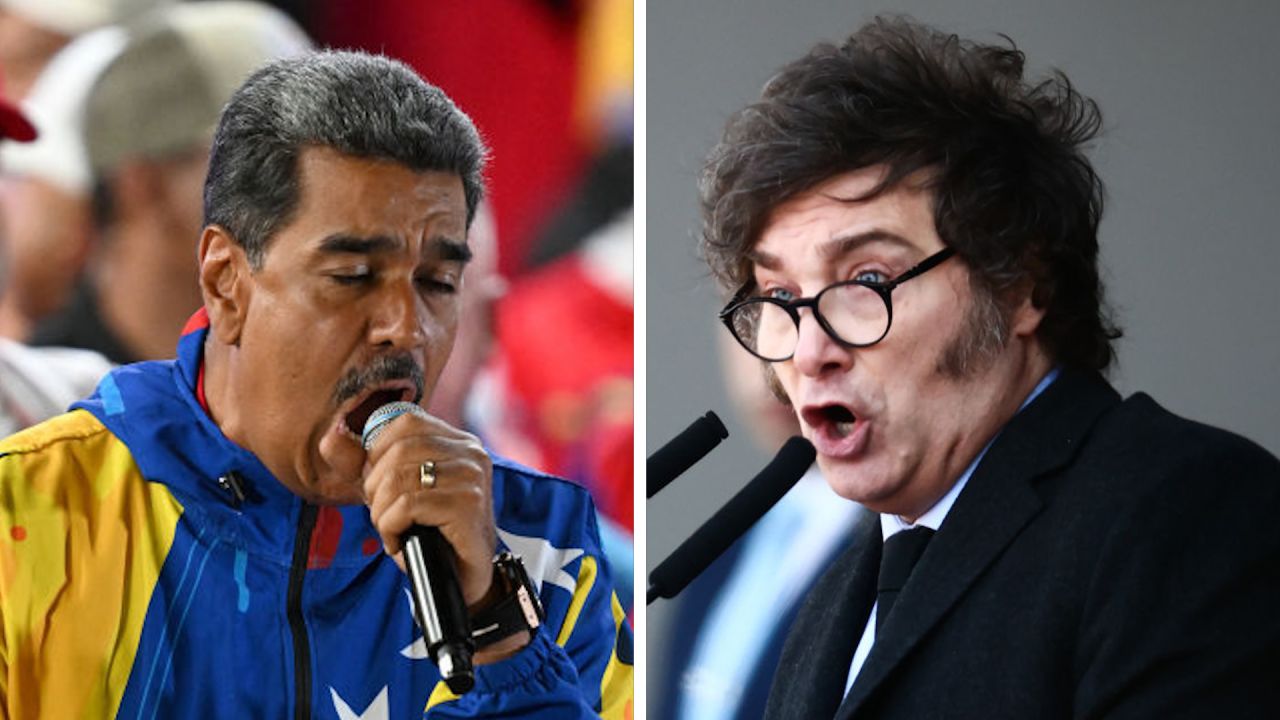( Spanish) – The attacks between Venezuelan President Nicolás Maduro and Argentine President Javier Milei continue and have now reached the judicial arena, in a confrontation that analysts consulted by say is useful for both leaders and their populist styles.
The bilateral relationship, which was at a minimum level, finally collapsed after the elections of July 28 in Venezuela, when the Maduro government broke relations with several countries (among them Argentina) that questioned the result released by the National Electoral Council (CNE), which declared him the winner without detailing the data.
The Argentine embassy in Caracas, which was represented by Brazil and where six Venezuelan opposition members have been seeking asylum for six months, was surrounded by security forces. This week, Venezuela’s attorney general, Tarek William Saab, announced that they would request arrest warrants against Milei and two of her collaborators – including her sister – a measure with a highly symbolic and political character. The Argentine foreign ministry responded that in Venezuela there is no separation of powers, and the presidential spokesman, Manuel Adorni, described the announcement as “delirium.”
Both Maduro and Milei “operate within the logic of extremes; they are two populisms, left and right,” respectively, he told Analyst Eduardo Martínez, professor at the South American Institute for Communication Education (ISEC, Argentina). For the political scientist, polarization is useful for both leaders.
During the Madrid Forum, Milei attacked Maduro and Lula, calling them tyrants
“Populisms build power from the enemy. There has to be an element that counteracts it (…) The proposal is imposition over dialogue, messianism over democracy. Each one plays by the rules according to the elements they have at their disposal,” he added.
The crossfire did not begin with the Venezuelan election campaign; insults of all kinds have been hurled at each other for months.
The dispute cements Maduro’s rhetoric of considering himself a target of foreign interference, while Milei tries to position herself as a reference for the opposition to the left.
Political scientist Eduardo Valero, director of the School of Political and Administrative Studies at the Central University of Venezuela, also describes both leaders as populists and pointed out that the dispute is a power struggle. “We are seeing a confrontation over a very strong centimeter of political discourse. The first benefit they seek to achieve is to tell their political forces that they are alive and that each one defends their interests from their position,” he told .
Valero pointed out that “in Venezuela, support for Maduro has been waning,” referring to polls prior to the July vote. “The only way forward is to seek confrontation to remain in the spotlight, staying on the wave, or as we say in politics, moving forward,” he explained.

Nicolas Maduro calls Javier Milei a “fascist” during his speech
While Milei often calls several leaders with whom he has not agreed communists, such as the president of Brazil, Luiz Inácio Lula da Silva, the president of Colombia, Gustavo Petro, or even Pope Francis, Maduro often calls the opposition and other right-wing leaders fascists.
“Fascism is a form of government that existed in Italy and Europe and is now dead. In Latin America, political expressions are different in each country. Today, the term fascist is a way of political disqualification to gain followers and has an important role in the exercise of polarization,” Valero said.
For his part, Martínez commented that the messages are directed more to an internal audience than to an external one.
“It is a moment where Maduro is extremely weak on the foreign front, not even some of his own allies have supported him. And on the domestic front there is a huge amount of protests, with the opposition leader being recognised as the president-elect by the European Union (Parliament). From every angle, Maduro is showing weakness. It is a way of flexing his muscles and saying: ‘I am capable of messing with other presidents’,” he said.
In Milei’s case, Martínez pointed out that it is a time of dispute with Congress, where he has had some setbacks and to which he sent the budget project for 2025 a few days ago. “It is also a way of showing some victory in the face of elements that are blocked to cover up his own weaknesses. At a complex moment in which the budget is being discussed, it diverts attention,” he said. In any case, he added that “Milei’s questioning Maduro does not change the ammeter” for the domestic front.
Martínez stressed that both leaders point to each other as a warning to citizens about the negative scenario that could occur. “In Latin America, it is presented as a bogeyman. If you behave badly, you are on the way to being like Venezuela or you are going to be like Milei.”
“Maduro benefits from having Milei just as much as Milei benefits from having a Maduro,” he said.
















Add Comment